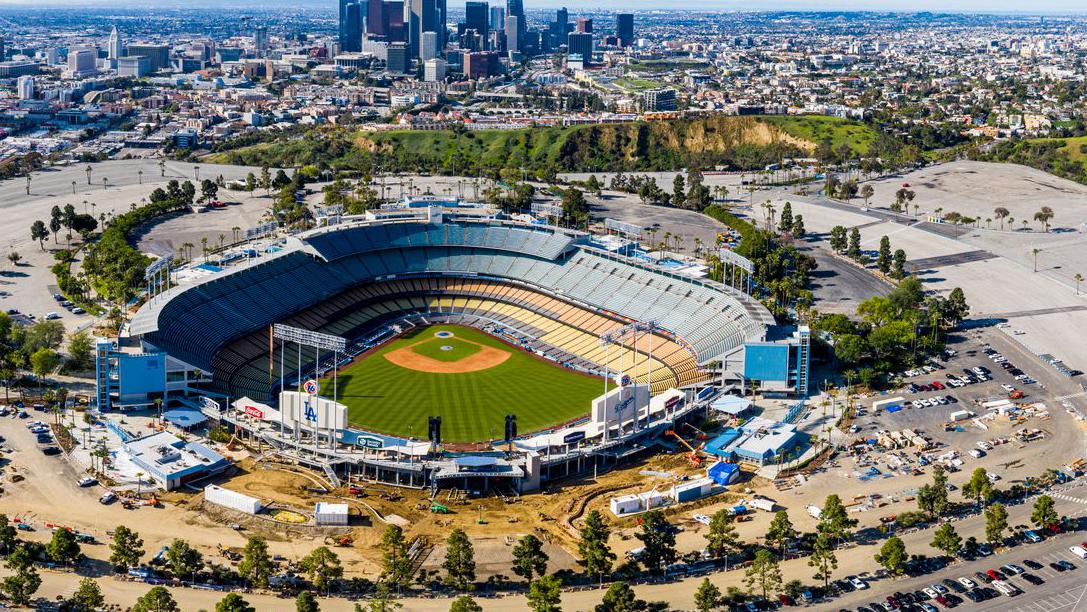On Thursday morning, June 19, 2025, a line of federal agents clad in tactical gear and driving unmarked SUVs appeared outside Dodger Stadium in Los Angeles. According to the Dodgers organization, these agents, identified by the team as belonging to Immigration and Customs Enforcement (ICE), sought permission to enter the stadium’s parking lots—but the franchise refused. With huge implications for immigrant communities and broader public discourse, the incident highlighted the delicate tension between federal authority and local autonomy in a city already on edge due to recent immigration enforcement efforts.
The Dodgers released a statement via social media that morning: “ICE agents came to Dodger Stadium and requested permission to access the parking lots. They were denied entry to the grounds by the organization.” The team also reassured fans that the game would proceed as scheduled later that evening nypost.com+9people.com+9the-independent.com+9. The agents, equipped with covered faces and weapons, were visibly stationed near Gate E as protests surged around them abc7ny.com+3latimes.com+3apnews.com+3.
Fans and community activists quickly gathered outside the stadium, carrying signs reading “ICE out of LA” and “No ICE in LA,” with the iconic “LA” logo morphing into a symbol of resistance en.wikipedia.org+3people.com+3the-sun.com+3. Many within the Dodgers’ primarily Latino fan base fear that these kinds of federal interventions aren’t about crime, but intimidation: “This is another example of the federal administration doing everything in their power to strike fear and hurt hardworking families,” said Governor Gavin Newsom’s communications director abc7ny.com+7washingtonpost.com+7youtube.com+7. City Councilmember Eunisses Hernandez echoed that sentiment, emphasizing that private property owners, like the Dodgers, have the power to deny access theguardian.com+1apnews.com+1.
The timing of the agents’ appearance wasn’t accidental. It came amid an eruption of immigration raids that began June 6, targeting multiple sites across Los Angeles—Home Depot stores, warehouses, and small businesses—resulting in widespread arrests and sparking a movement of protest, offense, and community-palms . What started as peaceful demonstrations quickly turned confrontational, with police deploying tear gas, rubber bullets, and National Guard troops while protestors clashed at downtown intersections washingtonpost.com+3en.wikipedia.org+3apnews.com+3.
California saw swirling images of unrest—flashes of police batons, burning barricades, and masses chanting “ICE out.” Within this atmosphere, Los Angeles became a flashpoint for what critics call an authoritarian campaign targeting immigrant communities. It was against this charged backdrop that the agents’ presence outside Dodger Stadium triggered urgent alarms.
Yet this incident also became a clash of narratives. While the team claimed the approaching agents were ICE, federal officials swiftly denied that designation. ICE posted on X (formerly Twitter): “False. We were never there.” The Department of Homeland Security, through Customs and Border Protection (CBP), clarified that its vehicles were briefly in the parking lot but were not involved in any enforcement operation youtube.com+8washingtonpost.com+8latimes.com+8. CBP Assistant Secretary Tricia McLaughlin told CNN that the agency had one vehicle idle after a malfunction, then moved on abc7ny.com.
However, eyewitness testimony complicated the federal version. An activist from Echo Park Rapid Response followed agents from a morning raid at a Home Depot to the stadium, and a CBP agent was heard saying detainees were brought near the stadium to be processed “without public interference”—something law enforcement is often barred from doing in crowded retail parking lots abc7ny.com+1latimes.com+1. The LA Times confirmed that the agents could be seen advancing toward parking lot entrances until Dodgers security barred them and redirected them elsewhere . LAPD confirmed that officers were present to ensure a safe departure of the vehicles washingtonpost.com.
Soon after the confrontation, the crowd outside the stadium gathered chanting and waving banners. One fan was escorted from the game for holding a protest banner reading “ICE out of LA” abc7ny.com+10the-sun.com+10people.com+10. Still, the Dodgers’ game against the San Diego Padres went on as planned, demonstrating that play would go on amid protest—a testament to the conflict permeating daily life.
The response to the incident wasn’t limited to words. On June 21, the Dodgers pledged $1 million to assist migrant families affected by the raids. President and CEO Stan Kasten framed the donation as a show of solidarity: “What’s happening in Los Angeles has reverberated among thousands upon thousands of people, and we have heard the calls for us to take a leading role on behalf of those affected,” he said latimes.com+2the-independent.com+2nypost.com+2. Several other LA-area sports teams, including Angel City FC and LAFC, had already weighed in, supporting immigrants and offering community resources even before the Dodgers clarified their stance the-independent.com.
Players themselves expressed outrage. Kiké Hernández, the Dodgers’ Puerto Rican infielder, wrote on Instagram that he was “saddened and infuriated” by the raids, demanding respect, dignity, and human rights for all latimes.com+2washingtonpost.com+2the-independent.com+2. And Dodgers Manager Dave Roberts described the agents’ presence near the stadium as “unsettling” people.com.
Local politicians used the moment to escalate their criticism. Napa Github: lean Newsom attacked federal enforcement actions as fearmongering. Councilmember Hernandez called the Dodgers’ intervention a rare but crucial defense from private property owners . Mayor Karen Bass condemned the raids as sowing terror and emphasized the right to protest peacefully even amid rising violence en.wikipedia.org.
Critics, meanwhile, warned that if CBP was conducting even routine processing in private lots, it could amount to an unconstitutional move to avoid local oversight. That charge—of processing detainees away from public scrutiny—could set a dangerous precedent .
Some observers viewed the incident through the lens of sports symbolism in Los Angeles. The Dodgers, champions in 2024 and storied members of the city’s multicultural fabric (think “Fernandomania” and decades of Latino allegiance), became more than a team—they became a battleground for civic identity washingtonpost.com. Singers like Nezza, who had earlier defied the franchise by performing the Spanish-language national anthem, symbolized resistance. That daring had already highlighted points of tension, and now the team’s actions extended that defiant posture into civic engagement people.com+1latimes.com+1.
Could this incident have broader ramifications? Absolutely. It shines a harsh light on federal-local conflict: when federal agents assert presence in local spaces during politically charged operations, even a baseball stadium becomes a stage. It calls into question the extent of federal authority on private property and opens potential legal battles. If CBP claimed it was merely needing space, could every chain store, stadium, or parking facility become ad hoc processing centers overnight? Many local governments are signaling a resounding “not here.”
For the Dodgers, the moment marked a shift. Sports teams are rarely political, but when citywide identity is strained, neutrality can feel complicit. Their decision to refuse access, followed by a large-scale donation, suggests an evolving posture: community advocate. But that stance risks backlash from federal authorities or those who believe sports should steer clear of politics. Yet in a city where 1.35 million residents are immigrants, and where baseball fandom and immigrant pride have long intersected, the Dodgers may have chosen their side—and in doing so, became more than a team.
Late Thursday, Dodgers president Kasten announced a delay in new community support initiatives, saying that the club needed time to coordinate following that morning’s events . The postponement illustrated the balancing act: engage meaningfully, but avoid reactionary moves that may backfire.
In the days since, a petition circulated demanding the team denounce raids more forcefully, reminding everyone that Latino families—about 40 percent of the fan base and worth $300 million in annual revenue—wanted more than vague solidarity the-independent.com. The Dodgers responded with transparency—first by denying access, then by donating funds—and left open the possibility of further actions.
Looking ahead, several unresolved questions remain. Will federal forces attempt to expand operations in private venues? Will the Dodgers face legal pushback or federal review? Will other franchises follow suit or stay silent? And what message does this send to immigrant families already fearful of deportation?
Despite these doubts, one truth emerged: in Los Angeles, everything is politicized—even a ballpark. And when the heart of a city’s identity takes a stand, it seldom goes unnoticed.



